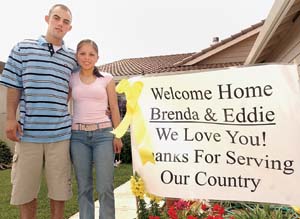
Sometimes love can surmount any obstacle
– even war.
Sometimes love can surmount any obstacle – even war.
Army Spc. Brenda Godoy, of Hollister, had a tough decision as time ran out on her service to the Army in January of 2003. She knew her division, the 82nd Airborne, was scheduled for deployment to Iraq soon and her newly-wed husband Eddie Gonzalez, would be going with it. So she made the hardest decision of her life, extended her military career three separate times and accompanied her husband into the heart of the Iraq conflict last fall.
Monday, after spending months embedded in one of the most tumultuous areas, the Sunni Triangle near the city of Fallujah, the young couple returned home to Hollister, leaving behind life in the war zone.
“I’m just so happy to be home,” Godoy said.
Stationed at Fort Bragg, N.C., Godoy, 24, met her husband Gonzalez, 21, in the Army, and the couple married in November of 2002.
When she enlisted with the military prior to the Sept. 11 terrorist attacks, Godoy said, she never imagined ending up in a war zone.
“When I signed up, I never thought I would ever go to war,” she said. “Then Sept. 11 happened, and it was like, ‘oh. God.'”
However, her love for her husband and country led her to continue her military career and head to war.
On Sept. 8, 2003, the couple, along with the entire 82nd Airborne Division, boarded a plane for the Middle East.
“When we were leaving the United States, I was feeling so many emotions,” Godoy said. “When you’re going into a situation like that, you have to prepare for the worst, and I just remember thinking, ‘I don’t know if I’ll ever see this place again.’ ”
After spending their first month of deployment preparing equipment in Kuwait, Godoy and Gonzalez spent three days in a convoy traveling to their new home in Iraq. The convoy set up base at some abandoned buildings roughly 30 miles from Fallujah, recognized as one of the most dangerous areas in Iraq.
“When we first got there, we had no electricity, water, nothing,” Godoy said. “We literally had to turn nothing into a base.”
At the makeshift base, Godoy and Gonzalez woke each morning around 5:45, got into formation and did physical training with their battalion. Throughout the day, Godoy would spend most of her time managing paperwork and making sure infantry divisions received water, fuel and any other supplies they needed. Gonzalez, mostly working on water supplies, had to exit the safety gates of the base for missions an average of three times a week.
“I would pray before we went out on a mission. And the minute we left the gate, I was like a hawk looking every which way,” Gonzalez said. “Being out there it’s like your senses have been multiplied. You have to realize someone is out there and wants to kill you, and you don’t want them to have the upper hand.”
Godoy and Gonzalez said monthly mortar attacks on the base reminded everyone of their dangerous surroundings and kept them on alert.
“Sometimes, we would even get attacked on base, and we were like ‘crap, I thought this was supposed to be our safe place,'” Gonzalez said.
After six long days of work, the GIs cherished Sundays off. To help keep the stress of war off their minds, some of the them started their own tournament where different battalions played soccer against each other.
“It was just a way for us to not think about what was going on and enjoy ourselves,” Gonzalez said.
As the base continued to develop, the GIs were able to access the Internet and even watch television. It allowed them to see how the media was portraying the war, and Godoy and Gonzalez said the coverage back home was less than accurate.
“I think it was exaggerated on both sides,” Godoy said. “I mean there are a lot more Iraqi people who are happy we’re there and want to better their lives than there are who don’t like us, and I think the media overexaggerates the work of the Americans. We’re over there doing positive things, and that’s what should be focused on.”
Spending seven months in war conditions has changed the couple. Despite the hard times of their deployment, such as missing home, having to see poor, barefoot, Iraqi children run up asking for food or money and dealing with the day-to-day stresses of being in a war zone, they feel they’ve come back better people.
“I feel so fortunate to live here,” Gonzalez said.
“You appreciate so much more,” Godoy said. “You realize when you get back how much Americans take for granted. We really do live the life of luxury here.”








